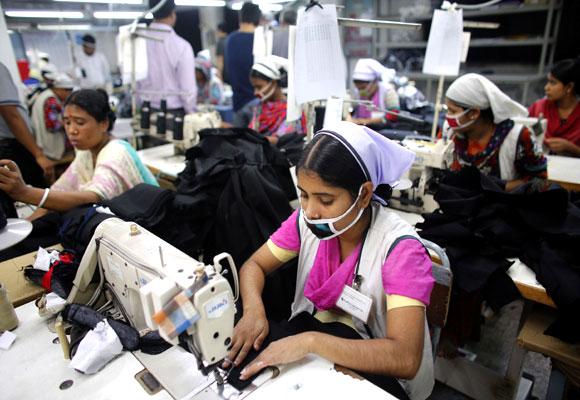
As pay levels rise in traditional factory-floor nations, Bangladesh stands as a last outpost of cheap labour.
Bangladesh's garment boom has made Mohammad Fazlul Azim a wealthy man. Over three decades his empire has grown from a single factory to a string of plants that employ 26,000 workers and clock up an annual turnover of about $200 million.
Azim, who is also a member of parliament, has benefited from government policies to grow the industry into a global powerhouse.
His elegant home here in Dhaka is a haven of luxury with an outdoor swimming pool, walled off from the chaos of the capital's streets.
Click on NEXT for more...
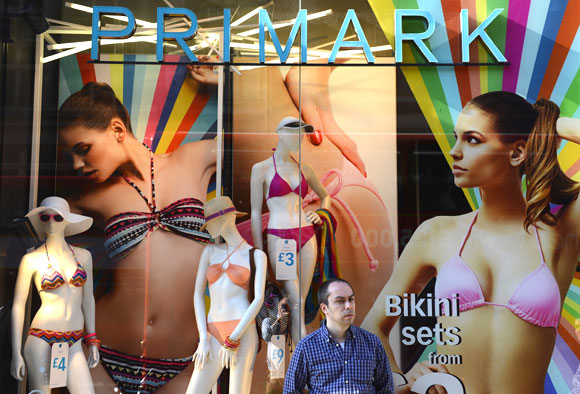
But he has a complaint: His costs have almost doubled over the past several years. It's now time for the big Western brands he supplies to pay more for their clothes, and stop squeezing his margins, he declares.
"The buyers have not given anything. They just say 'increase your productivity'," Azim said in an interview.
Click on NEXT for more...
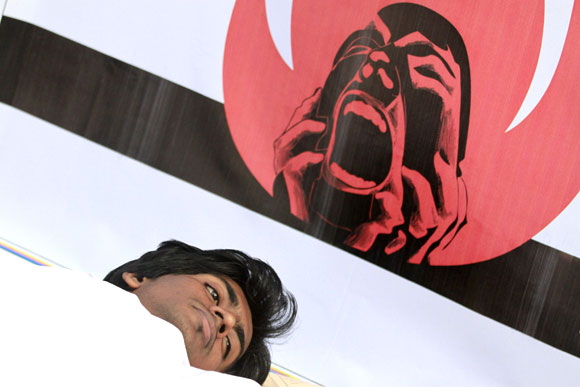
In workshops across this South Asian country of 160 million people, however, few are sympathising with the textile tycoons and their bottom lines. Western retailers are powerful, but so too are the garment moguls.
Thanks to their political clout and now a new Industrial Police force that crushes dissension at their plants, labour activists say, it is the factory owners themselves who keep garment workers' wages lower than anywhere else in the world - and all too often get away with lax safety standards.
Click on NEXT for more...
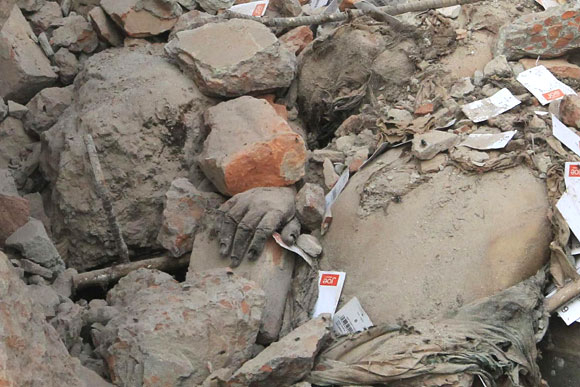
The collapse on April 24 of an eight-story building near Dhaka that housed several garment factories was a harrowing reminder of the collective failure - by the authorities, owners and buyers - to ensure that cheap doesn't mean dangerous.
The Rana Plaza tower fell like a pack of cards. More than 430 workers were killed and scores remain missing. It was the third deadly incident in six months to raise questions about worker safety and labor conditions in the poor South Asian country, which relies on garments for 80 percent of its exports.
Until now, there has been little pressure here to improve safety conditions and wages for the 4.5 million Bangladeshis working in the industry. That inertia stems, in part, from how deeply the industry has woven itself into the power structure.
Click on NEXT for more...
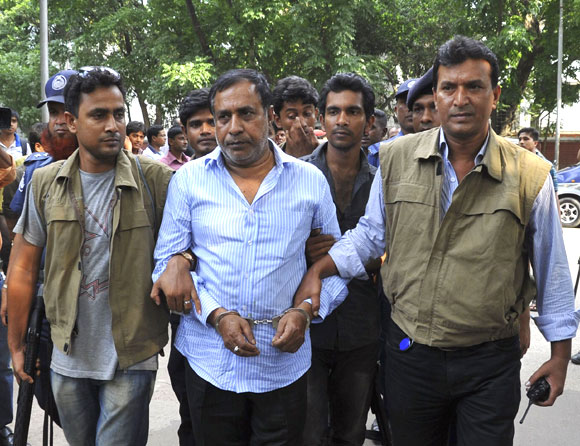
More than 30 garment industry bosses are members of parliament, accounting for about 10 per cent of its lawmakers.
Other owners, like Mohammed Sohel Rana, the owner of the building that collapsed, have strong political ties: He was a local leader of the youth wing of the ruling party, the Awami League.
Rana was arrested trying to escape across the border to India and faces charges of unlawful construction causing deaths. Bangladesh officials say his eight-storey complex was built on swampy ground without the correct permits.
"At least 50 per cent of the members of parliament have business links of some sort," says Babul Akhter, a leader of the Bangladesh Center for Workers Solidarity, an organisation that works with labor unions.
He alleges that many of these politically connected garment makers take advantage of their their clout to disregard the minimum wage levels stipulated under the law.
Click on NEXT for more...
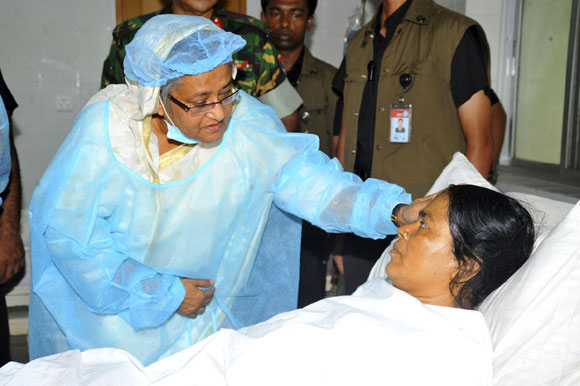
Activists such as Akhter who campaign for safer factories and better wages are often treated as enemies of the state in a country whose economy would be devastated if Western brands pulled out.
One prominent campaigner, Aminul Islam, paid the price last year: Bearing signs of torture, his body was found one day many miles from where he was last seen.
The government dismisses allegations it had a hand in the killing of Islam, but he had been detained and tortured by security forces in the past. His killing is still under investigation, and no arrests have been made in the case.
Akhter himself was arrested for inciting mob violence and beaten in jail three years ago after a bout of labor unrest; today, he says he still has charges pending against him from that time, and is followed by unknown men who, he suspects, are intelligence agents.
"There is no reason to follow him," said Mainuddin Khandaker, the second-ranking bureaucrat in the home ministry. "We don't have any such reports."
Click on NEXT for more...

Last outpost of cheap
As pay levels rise in traditional factory-floor nations, Bangladesh stands as a last outpost of cheap labour, an advantage that has helped lift it to number two in the global ranking of garment exporters, behind China.
Bangladesh ranked last in minimum wages for factory workers in 2010, according to World Bank data, behind Cambodia, the last country added to the global supply chain in 2000.
"It's the lowest of the low in terms of wages," says Malte Luebker, the International labor Organization's senior wage specialist for Asia-Pacific. "Wages are the key drawing point."
How Bangladesh remains so competitive is, in part, the story of powerful First World retailers playing factory owners, such as Azim, off each other to secure the lowest price.
Click on NEXT for more...

It is also the story of a government that stifles labor activism both to protect the country's economic lifeline and to please business magnates who have become part of the political and social establishment.
It's a set-up that suits everyone, including customers in the troubled economies of Europe and North America who want discounted T-shirts and trousers from big brands such as Wal-Mart, Target, H&M and Loblaw.
What makes it all possible is the Bangladeshis who make the clothes, many working in hazardous conditions and some earning less than $2 a day.
Click on NEXT for more...
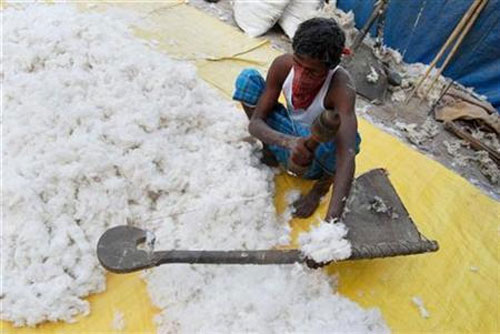
'Next eleven' economy
The garment industry is emblematic of Bangladesh's rise as an emerging economy in recent years. Once the eastern wing of Pakistan, Bangladesh won independence after a bloody war in 1971 that left its economy shattered.
The disaster-prone country became a byword for desperate poverty in the years that followed, dependent on foreign aid as it struggled with political instability, corruption and over-population.
Today, thanks in large part to the explosive growth of its garment industry, Bangladesh is included in the so-called "Next Eleven" economies, a term Goldman Sachs coined to describe countries such as Indonesia and Iran, Mexico and South Korea that have the potential to become some of the world's biggest emerging economies this century.
Until 2004, the Multi-Fibre Agreement (MFA) imposed quotas on developing nations' textile and garment exports to rich nations. It gave Dhaka and its rivals fixed market shares; when it expired at the end of 2004, Bangladesh braced for ruinous competition, particularly from China.
Click on NEXT for more...
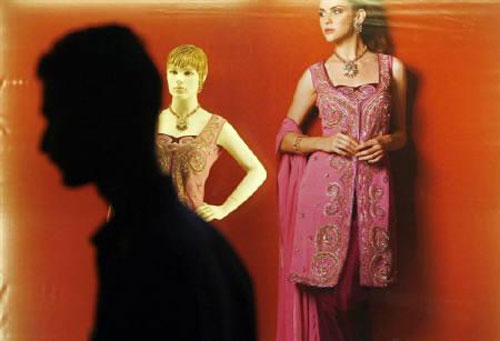
Instead, its apparel exports leapt, tripling after the expiry of the MFA to $19 billion in financial year 2011-12. That has narrowed the export gap with China. Labor shortages, wage inflation and a shift to higher-value manufactured products have made China less attractive as a source for garments.
The dismantling of quotas led to a "fast-money culture" that spawned a new class of garment moguls who found their way into politics and the media, said the representative of a big American retailer in Dhaka.
Western chains can retail clothes from Bangladesh for up to 10 times factory-gate prices. They began piling into the country in their never-ending quest for rock-bottom costs. Directly or indirectly, they have been sometimes doing business with Sohel Rana and the garment moguls.
Click on NEXT for more...
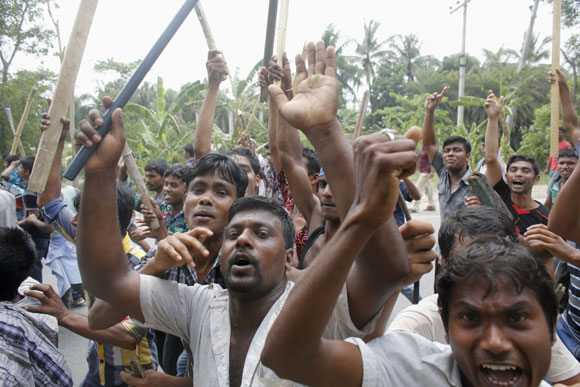
Wages begin to rise
The big retail chains, offering big-volume orders, are spoiled for choice. Bangladesh has more than 3,500 garment factories. Trade pacts offering favourable access to Bangladeshi goods also help: Europe takes 60 per cent of the country's apparel exports, the United States 23 per cent.
Set against those advantages are the congested roads, the lack of a deep-sea harbour and crippling power shortages. Grinding political unrest regularly leads to general strikes that paralyze the economy and add pressure on factory owners.
Weeks before the Rana Plaza collapse, the Bangladesh Garment Manufacturers and Exporters Association (BGMEA) said strikes and unrest may have cost the country $3 billion worth of potential new business.
Garment workers won a victory of sorts in 2010 after months of violent protests over pay and conditions. The government raised the monthly minimum wage by 80 per cent to 3,000 takas. Only a small fraction of workers are actually paid the minimum, however: Several factory owners said the average wage in their factories is around 5,000 takas.
Click on NEXT for more...
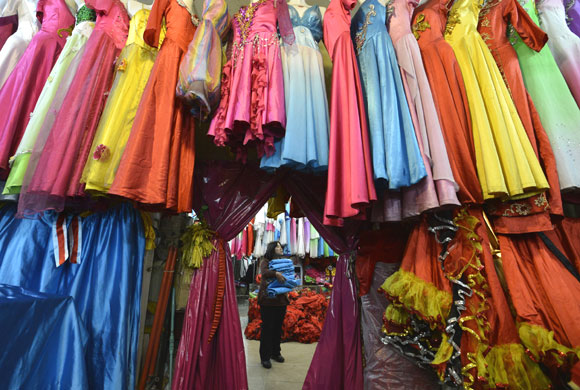
That's still much lower than in China, where the minimum wage for garment workers ranges from $154 to $230 per month, and in Cambodia, where the monthly base is $80, according to the International labor Organization.
Drawn by the lower costs, even Chinese garment businesses are moving to Bangladesh.
Cherry Body Fashions, a lingerie and swimwear factory in an export-processing zone outside Dhaka, is a stark illustration of the shift. General Manager Wallace Chu says 10 years ago, the company's owner, a Hong Kong firm, had 3,500 workers in China. Now it employs just 200 there - and 2,500 in Bangladesh.
"My boss will be moving more and more business here to survive," Chu said.
Click on NEXT for more...
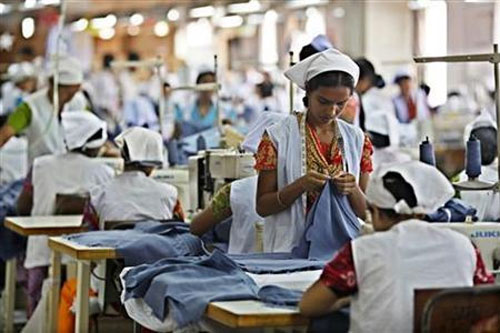
Race to bottom
The Western brands regularly press the Bangladeshi government and the garment manufacturers association to ensure factories are safe and workers are paid decent wages. But, says Mikail Shipar, the top bureaucrat in the Ministry of Labor and Employment: "They say we should raise the minimum wage, but they are not very eager to raise their purchase rates."
Several plant owners, factory managers and representatives of retailers in Dhaka, none of whom would speak on record about the subject, said the brands are paying less and less.
One said a buyer paid him $5.00 per piece for a particular make of shirt in 2011 and then offered $4.50 for the same thing a year later. Another estimated that overall prices have fallen by 40 per cent over the past two years.
"They pay you like a beggar and take quality like a king," said Abdul Mannan, who helped open up the industry when he was textiles minister in the early 1990s and now owns more than two dozen factories at home and abroad.
Click on NEXT for more...
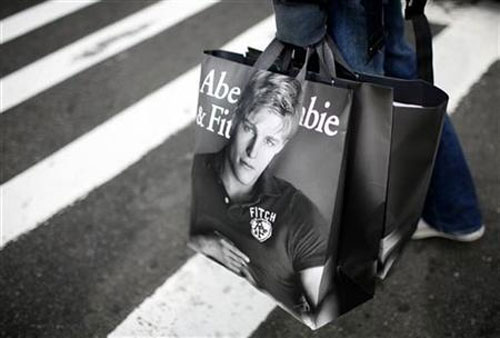
Sometimes buyers refuse to negotiate because they know competition among factory owners for high-volume orders is intense.
"It's not so much the fault of the brands as the employers who are under-cutting each other," said a representative of a large American brand in Bangladesh.
"If people are under-cutting each other, of course we take advantage of that - so prices are going down and down and down."
Click on NEXT for more...
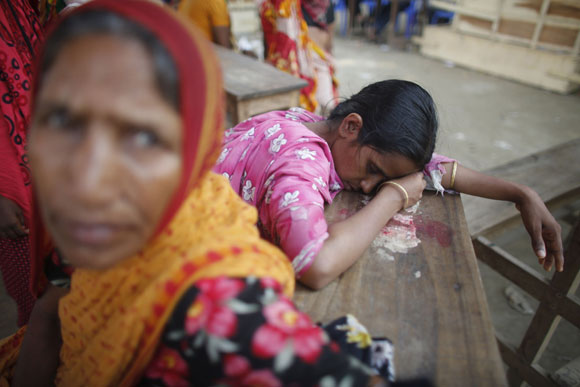
Labour suppression
Labour activists say that just as the brands squeeze their suppliers, factory owners scrimp on the wages they pay - and enjoy the political backing to get away with it.
A study by the Fair Wear Foundation, a non-profit lobby group, found that some workers were receiving less than the new minimum, nearly a quarter were reassigned to lower pay grades and bonuses were reduced.
Many factory workers live in the squalid back streets of the capital. Among them is Minara, who declined to give her full name. She is one of more than 3.5 million women who work in the apparel industry.
Home for her is a single windowless room she shares with her husband and a 15-year-old daughter. The girl, like her mother, is a helper in a factory measuring collar sizes and arranging bundles of cloth. Together, even with overtime, Minara and her daughter barely earn more than $90 a month, half of which pays for rent.
Click on NEXT for more...
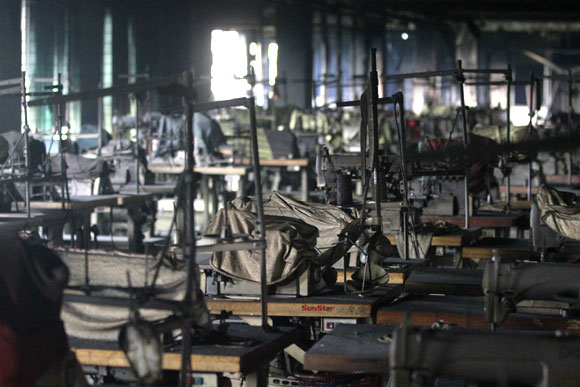
Standing in her doorway and looking out at a toilet and kitchen area that she shares with neighbours, Minara says that the price of a shirt in Europe or the United States is about what she earns in a month. "But if the government took the situation seriously, and gave orders to the owners, then it would all work better," she said.
The government has helped keep a cork on labour activism. In 2010, in the midst of the labour violence that year, it set up a 2,990-strong Industrial Police force to collect intelligence and prevent unrest in factory zones.
"If any unions demonstrate or raise their voice, the industrial police will come and tell them to stop protesting," said Akhter, the labor activist. "If they don't stop, they are attacked and beaten with sticks."
The government denies that unions are suppressed. It says many activists are politically motivated and, backed by non-governmental organizations in the West, deliberately stir up social unrest.
"We support the unions and want them to play a greater role," said H T Imam, a cabinet member and adviser to the prime minister, told Reuters. "We are quite pro-labour."
Click on NEXT for more...
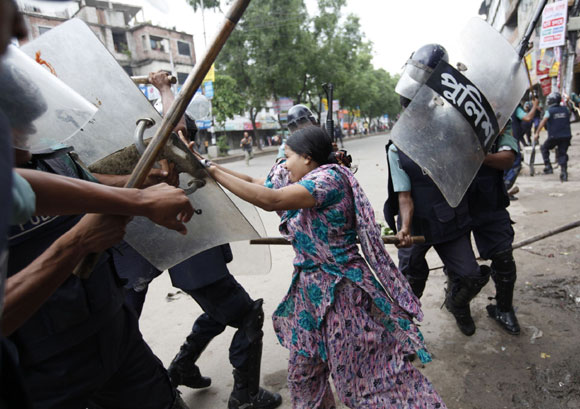
No prosecutions
Azim, the factory owner and lone independent member of parliament, said garment business leaders are "socially connected," but he denied reports they grease the wheels through donations to the main political parties.
Said one industry official in defence of the owners who are members of parliament: "It's true that many of these people are really big and hold enough power to lobby the government, but I haven't seen them put up one bill or discussion (about the industry) in parliament."
The apparel industry body, the BGMEA, is routinely criticised in the media for protecting its members when accidents happen at factories. Human-rights groups say there has never been a case in which a factory owner was prosecuted over the deaths of workers.
Click on NEXT for more...
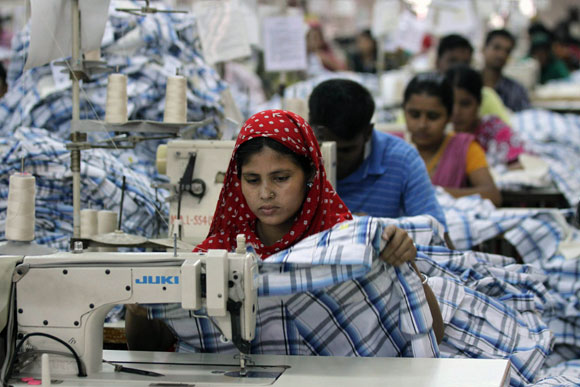
The BGMEA said it discussed safety issues this week with representatives of more than 40 brands, including H&M, J C Penney, Gap Inc, Inditex, Levi's, Marks & Spencer, Tesco, Target, Nike Inc, and Primark. The group said in a statement on Thursday the buyers set up a committee "to look at all safety-related issues of apparel units, including their building structure."
In November, scores died in a garment-factory fire, many of them because supervisors ordered workers back to their stations even as an alarm rang and smoke rose through an internal staircase.
The owner of the plant was absolved of blame in the BGMEA's report on the incident. The government said it suspected the fire was an act of sabotage - though that was never proved. Calls for the factory owner to go on trial went unheeded.
Additional reporting by Serajul Quadir in Dhaka